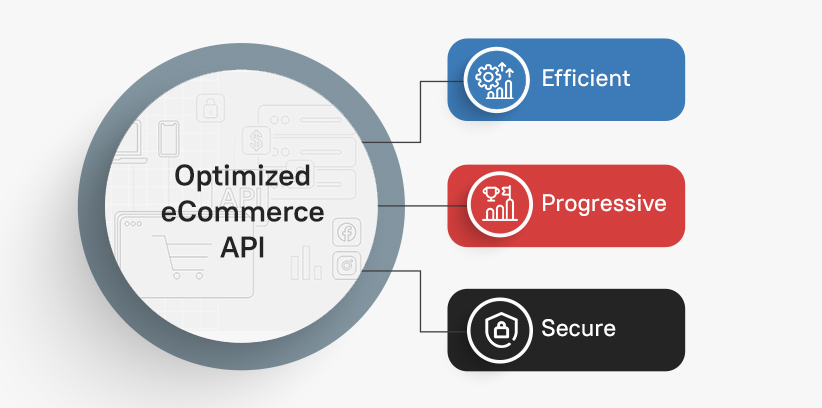For many years, eCommerce websites were primarily static and hosted on a single server. However, thanks to the help of eCommerce Application Programming Interfaces (API), eCommerce websites are now dynamic and can be built effectively even from scratch. An API enables diverse systems within an organization to communicate with each other in an automated way. An eCommerce API may be utilized for content management systems (CMS), customer relationship management (CRM), and mobile application development.
What Is an eCommerce API?
An eCommerce API can be seen as a set of guidelines that enable communication between different types of software systems. It allows for the creation of a seamless experience for customers. It facilitates navigation by enabling users to access, for example, product catalogs from anywhere, at any time, and on any device. The main benefits of using an eCommerce API include:
- Ease of integration – Businesses don’t have to worry about integrating different systems because there are established standards in place; these established standards can be utilized effectively.
- Reduction of costs – This is perhaps the most important aspect, especially for a growing and ambitious business. An eCommerce API can help lower the cost of developing new sites or apps because critical development elements and their functionality already exist within the system. This also makes it easier for developers familiar with one platform but not another (e.g., iOS vs. Android) because they won’t have many differences when working within each app’s ecosystem.
This makes eCommerce APIs an excellent tool for integrating business eCommerce platforms with other systems.

Better Integration Abilities
An eCommerce API can be used to integrate different systems. For example, you can use an eCommerce API to integrate your eCommerce system with a payment gateway or third-party service that handles shipping and delivery.
An eCommerce API can also be used to integrate two different eCommerce platforms, such as when one company has a website, and another has an online store. Similarly, an eCommerce API could be used for cross-selling between different websites owned by the same company (e.g., mysite1 and mysite2).
Better Synchronization Between Different Interfaces
Because a commerce API is essentially a set of rules that allows two different systems to communicate with each other, it can help integrate a third-party system with the eCommerce website. It can also create new features on top of an existing platform.
An example would be if a business sells a particular kind of paint and wants to add new products like brushes or thinner based on data from other websites like social media platforms. Effective use of eCommerce API could help sync products in real-time so they appear on the business website when someone clicks “Buy Now.”
The eCommerce API facilitates interaction between different systems. It’s a software interface that enables the exchange of information between two applications if both are designed to use the same protocol. This technology helps businesses integrate different eCommerce systems like Magento or Shopify into their website, which also helps extend their functionality.
Additionally, eCommerce APIs are an effective innovation technology that can provide access to data, products, and services from different eCommerce platforms in a standardized way. This can help developers build applications over them.
Some More Benefits of eCommerce APIs at a Glance
Higher Productivity | APIs are built with a service-oriented approach. This allows them to operate across different applications and platforms. This reduces the time and effort of a web developer and thus helps extend productivity. |
Increased Security | APIs provide eCommerce data security through encryption measures. When a visitor is at the website checking their order status, the API of the logistics partner facilitates information transfer through secure measures such as encryption. |
Convenience | eCommerce APIs allow businesses to connect with new systems without changing the original hardware or program. Less complex coding is required to facilitate new and more complex transactions. |
Cohesive Integration | eCommerce APIs can help create e-stores with the help of platforms customized to business needs. Companies can connect with applications to organize better and manage critical eCommerce elements of shipping and products and services. |
Reusability | eCommerce APIs are reusable in that they can be implemented across platforms and tools. This quality helps reduce the overall time developers spend on projects, thus helping drive productivity. |
Extensibility | An API connects different elements of the eCommerce business, opening communication between them. Thus, when a visitor checks in for the shipping status of their order on an eCommerce website, the API of the logistics partner will ‘talk’ to them, providing relevant information. This helps extend application functions and reduces work and time taken. |
Scalability | eCommerce APIs enable connectivity with any existing system the business uses. It also allows connecting with different or new systems without modifying the original software tool. In this way, with a bit of coding, APIs enable better connectivity, resulting in better scalability and business growth. |
How do eCommerce APIs work
eCommerce APIs work by enabling different software applications to communicate and exchange data with each other. In the context of eCommerce, APIs allow online stores to connect with other software applications, such as payment gateways, shipping providers, and inventory management systems.
Here’s a simplified explanation of how eCommerce APIs work:
- A developer creates an application that needs to access eCommerce data or functionality, such as product information, customer details, or order management.
- The eCommerce platform provides an API that exposes specific endpoints, which the developer can use to send requests and receive responses.
- The developer integrates the API into their application using Python, Java, or PHP programming languages.
- The application sends requests to the API, requesting specific data or actions.
- The API processes the request and sends back a response, typically in a standard data format like JSON or XML.
- The application uses the data received from the API to perform the desired functionality, such as displaying products on a website or processing a payment.
eCommerce APIs allow developers to build applications that can interact with eCommerce platforms and perform a wide range of tasks, from retrieving product information to processing payments and managing orders. With APIs, online stores can streamline operations, reduce manual tasks, and integrate with other software systems more efficiently.
How to Implement
eCommerce APIs are innovative assistance for e-businesses.
However, given the technical understanding and infrastructure required, deploying successful eCommerce APIs is best handled by experts. One of the most critical aspects of eCommerce API implementation is business need analysis. Especially for fast-growing, ambitious businesses, having a dependable outsourcing partner can help with practical and optimal API implementation for any e-store or eCommerce website.
Next Steps
- Learn more about the benefits of custom eCommerce web development, including optimal API implementation, and how we can help boost your business profitability at https://www.analytixit.com/.
- Please email us at sales@analytix.com or call 781.503.9003 today.
- Follow our blog for industry trends and the latest updates.
- Engage with us on LinkedIn and Twitter.
